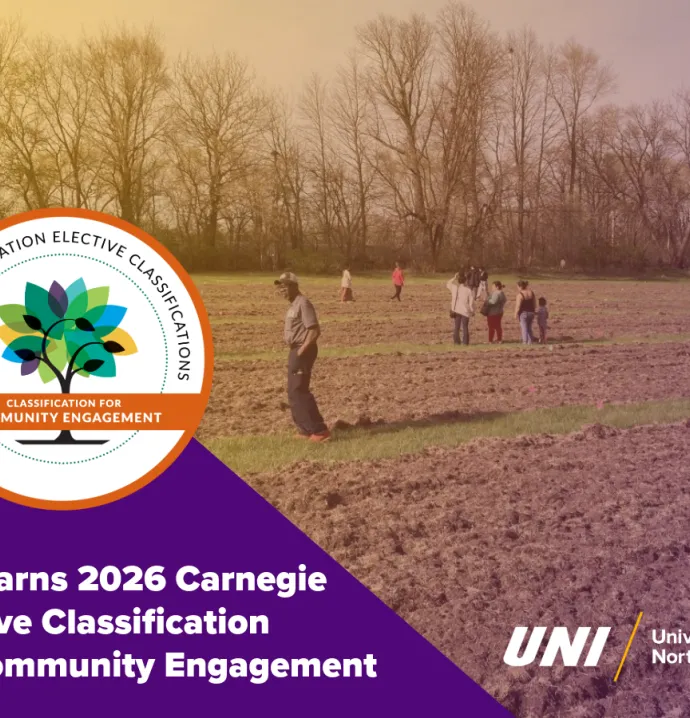The value of forgiveness
The value of forgiveness
2020 brought plenty to be angry about. There’s been a global pandemic, a national reckoning with racial injustice, an economic crisis and a presidential election - all of it debated each day on social media. But UNI education professor Suzanne Freedman, who has specialized in forgiveness research over nearly three decades and teaches a course on the subject, said now may be a good time to remember the benefits of forgiveness, empathy and understanding.
What is forgiveness? What benefit does it have for us, especially when the person or institution that wronged us hasn't changed?
I am often asked “why forgive”, and my response is always the same: “What’s the alternative?” Although forgiveness cannot undo the injury or damage, it allows us to move forward in our lives free from the negative effects of anger, hatred and resentment. It offers us a way to heal while still acknowledging that what happened to us was wrong, unfair and extremely hurtful.
Research has found that benefits of forgiveness for both children, adolescents and adults include greater psychological and physical well-being, including decreases in anger, anxiety and depression.It also shows increases in hope, self-esteem, feelings of peace, improved relationships and academic achievement for students in school, as well as decreases in blood pressure, headaches and stress.
Many people feel that forgiveness is a sign of weakness - is that true? Does it require us to forget or excuse someone's behavior? Or not be angry about things they've done?
Forgiveness is not the same as reconciliation. Forgiveness is something the injured can do without any response from the offender. Reconciliation is dependent on actions from the offender. For reconciliation to occur, we would want/expect an admittance of wrongdoing and/or an apology and promise that the hurt won't occur again.
If we require an apology to forgive, we are leaving ourselves powerless as we put our healing in the hands and control of the offender. Initially, one may choose to forgive to feel better emotionally, physically or psychologically. However, during the process of forgiveness one begins to take the offender into consideration and think about him or her as an imperfect human being. Thus, forgiveness is more than a self-help strategy as one is not totally focused on the self when forgiving, even though the process starts out that way.
We have a right to feel resentment and anger. Many people criticize forgiveness because they mistakenly believe that anger is not part of the process. In fact, the opposite is true. We need to express our anger before we can forgive. Forgiveness involves admitting that one has been hurt, working through the feelings related to that hurt and then moving beyond them. The other important point is that the offender does not deserve our compassion because of their hurtful actions. However, we give it nevertheless.
How does forgiveness help with feelings of unhappiness and conflict that we may have over larger events and situations where we have no control?
Forgiveness can help us gain perspective and understand others better. One technique we talk about is reframing. It includes "seeing with new eyes" and recognizing the humanity and inherent worth of the offender. We see the offender as an imperfect human being, like us, who has dignity and worth because they exist as a human being. Reframing also involves expanding our view as the offender, so we don't just see them as the monster who hurt us. We work to recognize positive memories or images we have of the offender. We also try to gain an understanding of why the hurtful event may have occurred, not to excuse what happened but to better understand the offender and offense in context. This information does not lead to excusing the deep hurt, but to a better understanding of it and the offender.
We don't talk about forgiving tornadoes, hurricanes, fires or illnesses such as the coronavirus or cancer. We have to accept that they have occurred, which is different from forgiveness. We don't change our feelings toward them.
Thus, in relation to situations and events that we don't have control over, forgiveness helps because we can try to gain a perspective of what we do have control over and what we can do in the larger situation that is causing us unhappiness. For example, an individual who is feeling the impact of living in a racist society can personally work on the action they can take to become antiracist and help others do the same, they can personally work on forgiving specific individuals for any racist acts they had inflicted on them or they can also work on acknowledging their anger, unhappiness and other feelings related to the situation and express these feelings in a healthy way. Recognizing other people's humanity and imperfections as well as one's own imperfections and need of forgiveness in the past can also help during these situations.
Is self-forgiveness a real thing? How does it work and who does it help?
Self-forgiveness is a real thing. We have a model of self-forgiveness that is similar to our model of forgiving another. Self-forgiveness occurs when we have to forgive oneself for committing a deep, personal and unfair hurt. However, like in forgiving others, it occurs in the context of deep, personal and unfair hurt.
This can be hurt you have suffered due to your own actions. People who find self-forgiveness may be less likely to engage in self-destructive behavior or even hurt others.
Our society needs to do a better job of helping people realize that they can move on from their worst pains or actions. When individuals view themselves from the lens of only their hurtful behavior, they are not recognizing the fact that all human beings have inherent worth. Forgiving yourself will make it easier for individuals to become more forgiving of others, too.




